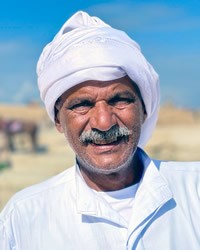Bedouin, Eastern Bedawi in Israel

Photo Source:
Copyrighted © 2026
Kerry Olson All rights reserved. Used with permission |
Send Joshua Project a map of this people group.
|
| People Name: | Bedouin, Eastern Bedawi |
| Country: | Israel |
| 10/40 Window: | Yes |
| Population: | 136,000 |
| World Population: | 595,000 |
| Primary Language: | Arabic, Eastern Egyptian Bedawi |
| Primary Religion: | Islam |
| Christian Adherents: | 0.00 % |
| Evangelicals: | 0.00 % |
| Scripture: | Portions |
| Ministry Resources: | No |
| Jesus Film: | Yes |
| Audio Recordings: | Yes |
| People Cluster: | Bedouin, Arabian |
| Affinity Bloc: | Arab World |
| Progress Level: |
|
Introduction
The Eastern Bedawi Bedouin of Israel is in transition as the men have left behind camels and usually drive automobiles and trucks today. They are no longer nomads traveling across the desert. Instead, they must be somewhat settled in permanent dwellings and adapt to a modern cash economy of Israel. Bedouin men tend to find jobs in Jewish towns working in security, in the military, in construction or in menial jobs. Most modern Bedouin women wear only a hijab rather than a full burka. The poorest in Israel, the Eastern Bedawi Bedouin need jobs that are appropriate to their social codes and job skills. They speak a dialect of Palestinian Arabic.
Ministry Obstacles
The Islamic religious system provides a strong deterrent to investigating the gospel.
Outreach Ideas
Pray for the Followers of Christ
Pray for the Entire People Group
Ask the Lord to call people who are willing to reach out and share the love of Christ with them.
Pray that God will raise up faithful intercessors who will stand in the gap for the Bedawi Bedouins.
Ask God to strengthen, encourage and protect the few known Christian Bedouin living in Israel.
Pray that their traditional Muslim culture will soften, creating open doors for the gospel to be preached among them.